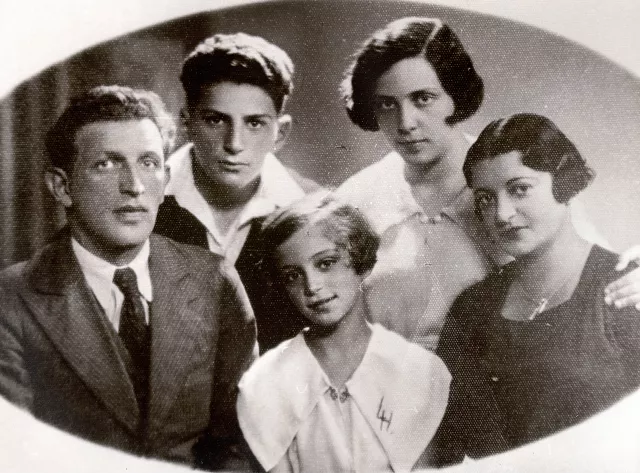This is a picture of me and my family, taken in Daugavpils in 1936. From left to right: my father Ilya Halperin, I and my mother Gerta Halperin, nee Gerson. Standing behind us are my brother Meyer Halperin and my sister Edit Yagolkovskaya, nee Halperin.
In the 1920s Papa became a widower with two kids at that time. He was a very handsome young man and my mother married him. All her aunts were trying to talk her out of doing it. But she didn't listen to them. That's how Mum entered this Latgalian family, which spoke Yiddish and Russian. The result of this interlacing of Kurlandian and Latgalian roots was that they spoke German and Russian. My mother didn't know a word of Yiddish, she only spoke German. And everybody used to make fun of her.
We were three children: my sister Edit, born in 1915, my brother Meyer, born in 1919, and I, born in December 1925. I didn't go in for any sports in school. I took music and ballet lessons. But I had absolutely no ear for music. Of course, we didn't pay for the music lessons. A friend of my parents taught me. She used to say, 'I've never had a less talented and lazier student'. So I dropped music quite soon. I went in for ballet for about two years, but due to my lack of hearing I didn't succeed there either. I had a pair of skates, but I wasn't an expert skater either. People used to go to the skating-rink every day back then, including Saturday.
There was a library in our home. Papa and Mama used to take care of it. Papa left me a huge collection of books after the war, but the pre-war collection was completely lost. We had some books during our evacuation in Semipalatinsk as well, but they got lost on the way from evacuation. As soon as we arrived, my father started to collect books. He collected books on the history of Jews, the Jewish Encyclopedia; he had all the works by Simon Dubnow and many works of fiction. He had good connections with antique shops and they sent him new books. Before the war my mother had German books and after the war she read both in Russian and German. The collection survived, but some books were borrowed by children.
Lia German with her parents and siblings
The Centropa Collection at USHMM
The Centropa archive has been acquired by the United States Holocaust Memorial Museum in Washington, DC.
USHMM will soon offer a Special Collections page for Centropa.
Academics please note: USHMM can provide you with original language word-for-word transcripts and high resolution photographs. All publications should be credited: "From the Centropa Collection at the United States Memorial Museum in Washington, DC". Please contact collection [at] centropa.org.







